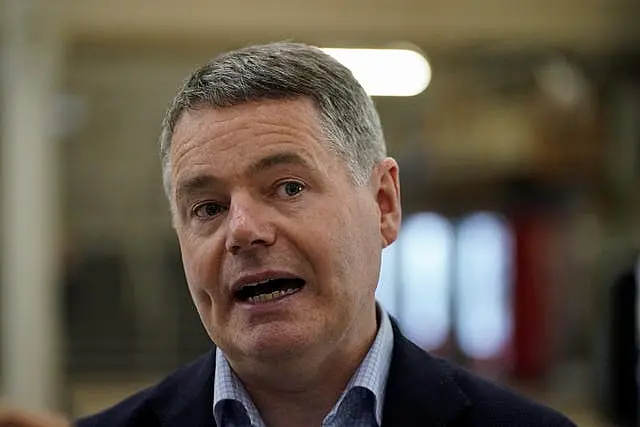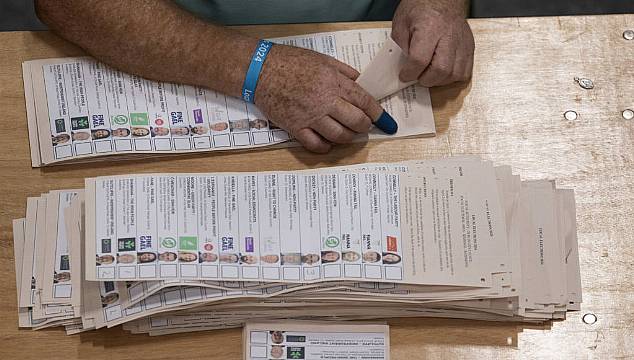Fine Gael minister Paschal Donohoe said the projection that Sinn Féin will be in the next Government has been “shattered”, as the party faces a tough local election battle.
Tally indications show a surge in the Sinn Féin vote has not materialised in the local elections, while the Government coalition parties are cautiously welcoming early results.
Paschal Donohoe, Minister for Public Expenditure, said: “The early tallies show that there is a large majority of people who are willing to vote in a very different way to how extremists and the far right will make the case for.
“I think there is a very compelling narrative to be made – at a very early stage in this – that Fine Gael has been successful in getting out its votes, that our campaign has made a difference, and that the approach of the Government parties has been recognised by voters.”
Asked about Fine Gael’s performance compared with Sinn Féin, he added: “Overall, the portrayal that some have offered of Fine Gael as a tired party – that narrative, that claim, has been shattered by the results that we’re seeing potentially coming through at the moment.
“And the other narrative that there’s anything inevitable about Sinn Féin being in government – that’s been shattered too.”
Mr Donohoe said the Government will “go the full distance” before a general election must be called by March next year at the latest.
Tánaiste Micheal Martin said his Fianna Fáil party is doing “far better” than predicted.
He said the party will gain an MEP seat in the Midlands-North-West constituency for the first time in 15 years.

“The idea that Fianna Fáil would be coming in a distant third is completely disproven,” the Tanaiste said at Cork City Hall on Saturday.
“I’ve been looking at opinion polls now for the last three years. This ‘internet panel’ polling having Fianna Fáil at 14% and 15% – clearly Fianna Fáil will be well ahead of that and will be over 20% by the time all of these counts are collated and put together.
“We put up a very robust performance and we’re holding our own compared to our performance in the general election of 2020.”
In Dublin, incomplete tallies by noon suggested Fianna Fáil’s Barry Andrews and Fine Gael’s Regina Doherty were leading.
Green Party incumbent Ciaran Cuffe, Independent Ireland candidate Niall Boylan, Labour representative Aodhan O Riordain and Sinn Fein hopefuls Daithi Doolan and Lynn Boylan will be fighting over the remaining two seats.
Speaking on Saturday, Mr Cuffe said the race was “hard to call”.
Asked if he believed he could stay ahead of Mr O Riordain and Social Democrat Sinead Gibney, the at-risk MEP added: “For the wildebeest, you just have to stay ahead of the lion.”
In the South constituency, Fine Gael’s Sean Kelly and Fianna Fáil’s Billy Kelleher are considered to be in contention for re-election.
Sinn Féin will be hoping to regain a seat in the region with Kathleen Funchion.
In sporadic observations from Midlands-North-West, there were reports of strong support for Fine Gael’s incumbent Maria Walsh and her running mate Nina Carberry.
Fianna Fáil’s Barry Cowen, Independent Ireland candidate and former RTE correspondent Ciaran Mullooly and Independent MEP Luke “Ming” Flanagan have also polled well in some regions across the vast constituency.
A clearer picture will emerge once counting begins on Sunday.

Green Party leader Eamon Ryan said early indications show there “won’t be a wipe-out” of his party.
He also said that his candidates Claire Byrne and Michael Pidgeon had the potential to top the polls in their Dublin city regions.
Speaking at the RDS count centre in south Dublin, he added: “My eyes are on the country, I think we have a chance in Dingle (with) Peadar O Fionnáin. It’s very tight to call, but he’s not out of the running.
“If we win a seat in Dingle I’ll be celebrating as much as Dublin Bay South, if not more, because that would send a really strong signal about the whole country.
“So far, we are hopeful, but obviously, we have to wait and see what happens. We look forward to see the next two days.”

Since the last General Election, politicians have had to rely on opinion polls to gauge the mood of the nation.
The 2020 campaign saw a massive increase in support for Sinn Féin, which took almost a quarter of the popular vote.
But the party was still left in opposition after failing to run a sufficient number of candidates in the parliamentary constituencies.
Estimated support for Sinn Féin then hovered above 30% for a long time, even temporarily reaching highs of around 35%.
However, polls over the last eight months suggest support is on a dramatic slide as independents take more of the expected vote share.
Many ballot papers contain a large number of independents with a variety of political leanings, several of whom have been described as anti-immigrant.
Fine Gael appears to have had a “Harris hop” in the polls after the shock resignation of Leo Varadkar as leader of the party earlier this year, leading to Simon Harris taking over that position as well as the role of Taoiseach.
The results of the three campaigns could direct Mr Harris’s decision on when to call the next general election, which must be held by March next year.
In the south-west, voters in Limerick city and county had the opportunity to directly elect a mayor with executive powers on long-term strategic planning.
The role is seen as a test case for other local authorities.
A cross-party tally from midday indicated that Independent candidate John Moran was in the lead with around 25% of the votes.
The former secretary general at the Department of Finance is ahead of Independent candidate Helen O’Donnell in second place.
The elections will be held again in five years.
The full results of the elections will take days to be finalised, but the results will provide political parties with evidence of voter sentiment, having had to wait more than four years since the last General Election.







